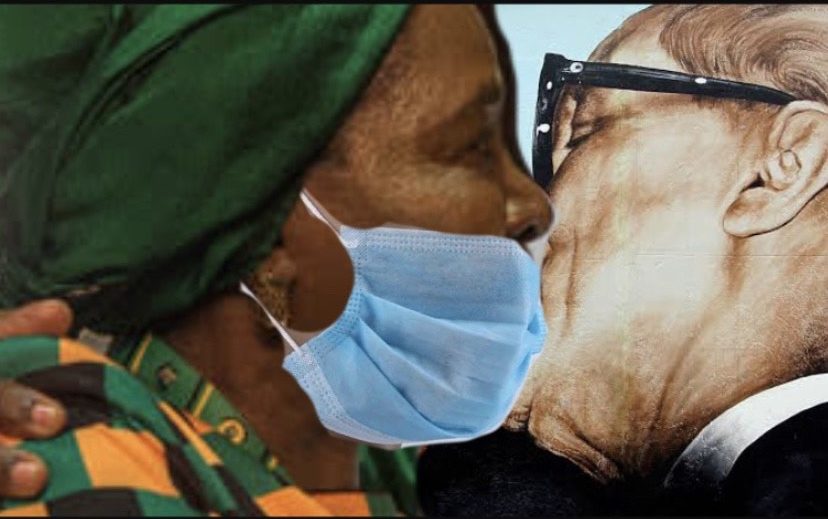News
An Iron Curtain Is Falling On Our Freedom
There is no place for Soviet-era practices — or ideology — in a modern economy and liberal democracy.

Research Director, The Brenthurst Foundation

Director, The Brenthurst Foundation

If Cyril Ramaphosa is in charge and wants to reform, he needs to rein in his errant ministers lest COVID-19 be the catalyst for a New Dusk, not Dawn.
Through the fog of the war against COVID-19, we are seeing the outlines of something new and disturbing emerge – and yet, for those old enough to remember, something oddly familiar.
What is beginning to emerge is the outline of an aggressively paternalistic state that distrusts people’s ability to make sound decisions, usurps moral authority, imposes controls, limits personal freedoms and dictates the trajectory of economic, political and social life.
This outline is still vague and (hopefully) contested, within the ANC, but it appears to have some momentum. Some of this impetus is down to circumstance.
The pretext for this invasion of personal space has been the COVID-19 pandemic and many of the steps taken to limit social interaction are legitimate. But there are others that are patently illegitimate, have no scientific basis and appear to be the enactment of fantasies about control which have, until now, been suppressed by the democratic constitutional order.
In its starkest form, this state appears in the person of Police Minister Bheki Cele, who has decided that the police, and not the courts, should be the arbiters of what is right and wrong.
Cele, you will recall, was appointed police commissioner by former president Jacob Zuma. His first action was to award himself the title of general and to restore military ranks to the police force before publicly urging the police to use deadly force if necessary.
The abuse began on the first day of lockdown. The first casualty appears to have been a 55-year-old Ravensmead man who died after being assaulted by police.
An autopsy found that he had died of heart failure, so the Independent Police Investigative Directorate cleared the police of wrongdoing, saying Petrus “Pietman” Miggels died of “natural causes”.
Miggels died because his neighbours sent him to a tavern with R100 to buy beer. On his way back with the packet in his hand, he was assaulted with a hammer, forced into a police car and driven away. He was later dropped off where he had been picked up and made it home before dying of heart failure.
Then there is the case of Collins Khoza, an Alexandra resident, whose family alleges he died after a brutal beating by SANDF members because he had alcohol in his home.
More than 100 charges have been laid against the police for abuses during the first three weeks of lockdown.
If Cele is the face of rising brutality, Co-operative Governance Minister Nkosazana Dlamini Zuma is the face of social control. In an extraordinary briefing on Wednesday evening, she countermanded President Cyril Ramaphosa’s announcement that tobacco sales were to be permitted under Stage Four of the lockdown, saying that smoking was bad for you and that there was a danger that people would roll and share what she described as a “zol”, passing the virus on to each other.
What she completely missed is that the lockdown has not stopped anyone from smoking. They have simply gone to the underground networks to buy illegal products, costing government taxes and fuelling organised crime. Or perhaps she knows that.
The ban on the purchase of tobacco and alcoholic beverages at least had the somewhat weathered fig-leaf of concern about health.
But the impulse for social control was further exposed by the ruling that exercise – walking, running and cycling – would be permitted only for three hours a day from 6am to 9am. The health consequences of maximising the chance of those exercising encountering others on the road by limiting the time for exercise was subordinate to the desire to control movement with no scientific, health or security justification.
Then came her announcement of a curfew from 8pm to 5am, again without a scientific justification other than to control. The regulations and their method would not be out of the place in the former Soviet bloc.
It was said that East Germany’s (officially German Democratic Republic) economy was like an old steam train, but unfortunately 90% of it went through the whistle. The state was incapable of making efficient decisions about allocation – of jobs, skills, resources, pricing and products. Prices were set by the government, not through the pressures of competition, supply and demand.
This reflected other problems. There was a failure to invest enough in higher education, and in R&D. Unable (or unwilling) to give a value to intellectual property, in a centrally-planned system conformity and obedience were encouraged at the cost of innovation. The underpinnings were there from school, however, where the emphasis was on rote learning.
And there was no political competition. The GDR was effectively a one-party state, governed by the Socialist Unity Party (SED) through an alliance organisation, the National Front of Democratic Germany. This system was brutally enforced by a pervasive security structure around the Ministry for State Security, commonly known as the Stasi.
By 1998 the Stasi employed a vast network of more than 90,000 agents and at least 189,000 “unofficial collaborators” (though the total of “information providers”, or Auskunftspersonen, is estimated to be over two million) to keep tabs and files on the GDR’s citizens. The Stasi perfected a technique known as Zersetzung (literally, “decomposition”), of continual psychological harassment, aimed at damaging the reputations and relationships of their subjects, causing them to lose the will to continue with their activities.
Stasi boss Erich Mielke summed up the purpose of the spy agency in a speech to the Central Committee in April 1981 as a “constant effort to clarify ‘who is who’… to identify people’s true political attitudes, their way of thinking and behaving… providing an answer to who is the enemy; who is taking on a hostile or negative attitude; who is under the influence of hostile, negative and other forces and may become an enemy; who may succumb to enemy influences and allow himself to be exploited by the enemy; who has adopted a wavering position; and who can the party and state depend on and be reliably supported by?”
Perhaps it’s no coincidence that some of the ANC leadership cohort cut their political teeth in these circumstances.
All of this newfound love for social control does not bode well for economic recovery which requires that the state urgently implements reforms which open up the economy and allows expanded private sector involvement in areas of the economy until now dominated by failed state-owned enterprises. Lest we forget the GDR, uber-controller as it was, collapsed precisely because its people tired of being second-rate Germans with access to smoky Trabants and not swish GTis. Consumerism triumphed over communism as East Germans voted with their feet and cash.
Yet GDR-style statism is illustrated by the long list of restrictions on which businesses may or may not open and how this should take place – in stages and with employees rotated according to a government dictat – announced by Minister of Trade, Industry and Competition Ebrahim Patel. This minister has taken his theory of state-led development to new depths in his decision not to allow online business to operate lest they gain an unfair advantage over their analogue counterparts. It’s better that all are workless than just some, apparently.

South Africa is at risk of being micromanaged into penury by people who seem not to understand the needs of a modern economy – the relationship between state and business, the role of technology and capital, the importance of innovation and skills, and the need for markets.
The desire to extend the state’s reach into business is possibly best illustrated by the actions of Small Business Development Minister Khumbudzo Ntshavheni, who said that spaza shops would be granted access to emergency funding provided they bought from a pre-approved list of goods drawn up by the government, including buying from businesses that the department supported.
How a supplier would make it onto this list was not spelt out.
It is not surprising and more than a little embarrassing that the United Nations has gone so far as to name South Africa as one of the countries abusing the lockdown with gratuitous violence.
It said it had received reports of “police using rubber bullets, tear gas, water bombs and whips, to enforce social distancing, especially in poor neighbourhoods,” the Reuters news agency reported.
The 39 incidents it had reviewed included “murder, rape, use of firearms and corruption” Georgette Gagnon, director of field operations said.
“Emergency powers should not be a weapon governments can wield to quash dissent, control the population, and even perpetuate their time in power,” she said.
This rising tide of statism is at odds with South Africa’s liberal democratic Constitution, which is based on freedom, dignity and human rights.
The architect of the Constitution is now in office and has been lauded by the public for his handling of the COVID-19 outbreak. He took swift action and imposed the severe lockdown early, which may have limited the spread of the disease.
But he has also opened the door to those in the Cabinet who see the people as a danger to themselves. They are using the COVID-19 crisis to fulfil fantasies about social control that may permanently endanger freedoms and place South Africa on a disastrous economic trajectory.
Ramaphosa has generated a lot of goodwill. But it might all vanish in a puff of ministerial gunsmoke and statism. There is no place for Soviet-era practices – or ideology – in a modern economy and liberal democracy.
If he’s in charge and wants to reform, he needs to rein in his errant ministers lest COVID-19 be the catalyst for a New Dusk, not Dawn.
This article was published on The Daily Maverick.

